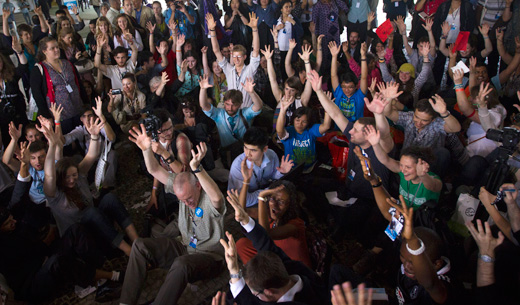
“An important biological species – humankind – is at risk of disappearing due to the rapid and progressive elimination of its natural habitat.” – Fidel Castro, speaking at the 1992 Earth Summit in Rio de Janeiro.
This year’s official Rio+20 conference, which ended June 22, was yet another disappointment to those around the world concerned with the rapid escalation of environmental threats. The weak-at-best conference statement merely reaffirmed the goals from 20 years ago for a sustainable world, without making any binding agreements which could make that actually happen.
Over 30,000 participants from 188 nations spent three days reviewing progress since the 1992 summit, and most observers concluded that not only has little progress been made, on the whole things have gotten worse. This follows several years of UN-sponsored climate change and environmental conferences which have also led to disappointing results – Cancun, Bali, Copenhagen.
As United Nations Secretary-General Ban Ki-moon said in his opening remarks, “Let me be frank: Our efforts have not lived up to the measure of the challenge. … Nature does not negotiate with human beings.”
This Rio meeting, 20 years after the first one, shows the limits of weak governmental action without a sufficiently strong grassroots movement.
It shows the tendency of international negotiations to be sidetracked into frustrating and often pointless debates which appear to be about the environment but which under the surface are all about competing national and corporate interests.
It shows the need for local, national, regional, and global actions and laws and treaties, combined with local, national, regional, and global mass movements. It shows the need to focus those movements only in part on governmental actions and laws. Only a vibrant combination of education, mass action, laws and treaties, technological innovation, and individual action and change will accomplish what we need.
Frances Beinecke, president of the Natural Resources Defense Council, noted, “The document reminds us that we can’t rely only on the slow wheels of bureaucracy and government negotiators to address the urgent problems facing our planet. We must start doing it ourselves, and Rio proved that we are.” He highlighted the tens of thousands of environmental activists from around the world who gathered alongside the “official” Summit and exchanged ideas and strategies they are already working on.
Carl Pope, former Sierra Club executive director and a co-founder of the Blue/Green Alliance with the Steelworkers, criticized both “ponderous conferences of distracted and un-ambitious governments ” and “cobbled together partnerships among private and non-profit parties.” For example, “the single biggest piece of policy alignment that would help move the Secretary-General’s vision of Sustainable Energy For All forward would be elimination of fossil fuel subsidies, which the International Energy Agency says are responsible for a full 5 percent of the world’s carbon emissions,” Pope wrote. “But ending subsidies on fossil fuels, though officially called for years ago by the G20, went nowhere in Rio.”
What the earth and humanity needs is becoming ever clearer.
The United Nations Environment Program (UNEP) Global Environment Report Fifth Edition (GEO 5), issued just before the Rio+20 conference, notes that the “World Remains on Unsustainable Track Despite Hundreds of Internationally Agreed Goals and Objectives.”
A slide show on glacial retreat offers clear visual proof that the earth is warming.
Studies show that temperature increases across the U.S. are speeding up. Despite variations in heat increases by region, all regions are experiencing more rapid warming, as exemplified by the historic heat wave currently being experienced across the entire U.S. except for the Pacific Northwest.
The world’s oceans are warming, expanding, and acidifying, due to human-caused climate change, and many ocean fisheries are collapsed, collapsing, or on the verge of collapse due to over-fishing, warming, pollution, and acidification.
There are some positive signs.
The U.S. and other countries agreed to much more comprehensive monitoring of ocean acidity. (An often forgotten part of the Bush administration attack on science were its efforts to de-fund environmental and climate monitoring and restrict the ability of government scientists to tell the truth). Even though this is not positive action on fighting ocean acidity, it is a step towards gathering more truth, more knowledge, more confirmation of what is actually happening. A small step, but positive.
The U.S. also agreed to partner with more than 400 companies, including Wal-Mart, CocaCola and Unilever, to support their efforts to eliminate deforestation from their supply chains by 2020. However, the history of many such public/private endeavors being used by corporations to “greenwash” their abusive practices leads to much deserved skepticism about whether the ultimate results will be positive or just more grist for corporate PR promotions. This is especially true of Wal-Mart, which tries to provide a “green” smokescreen for its labor- and environmentally-abusive practices.
CLEAN agreements (Clean Local Energy Accessible Now) are being implemented to develop over 1 gigawatt of solar power, which represents a significant leap in the development of clean energy generation.
The official results of international gatherings and negotiations are disappointing. But they do provide important benchmarks for how the world is reacting to the environmental crises facing us, valuable gathering points for thousands of activists, and an opportunity for worthwhile media coverage of the issues – an important part of building the massive worldwide movement needed to protect our environment, the natural world on which humanity depends.
Photo: Activists from several environmental organizations raise their hands in unison, voting to continue their protest at Rio+20, in Rio de Janeiro, Brazil, June 21. Victor R. Caivano/AP












Comments